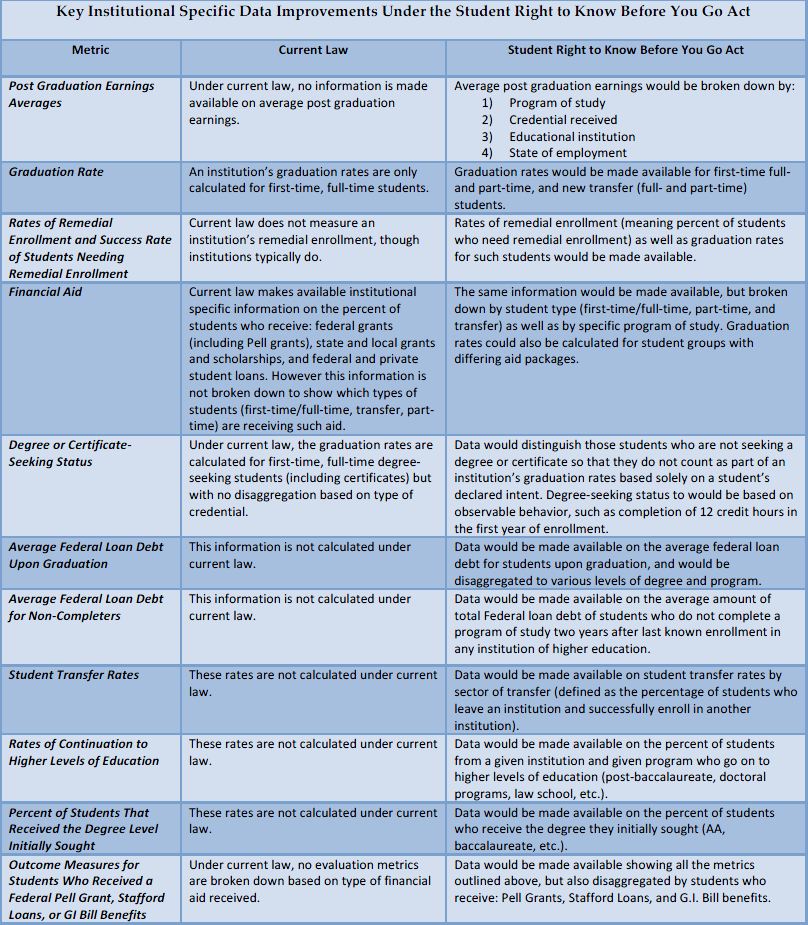House and Senate Lawmakers Announce Legislation to Help Students Choose Between Colleges
Student Right to Know Before You Go Act Would Make Accurate Graduation, Debt and Earnings Data Available
WASHINGTON – U.S. Senators Ron Wyden, D-Ore., Marco Rubio, R-Fla., Mark Warner, D-Va., and U.S. Representatives Duncan Hunter, R-Calif., and Robert Andrews, D-N.J., today introduced bicameral, bipartisan legislation that would ensure that a wide range of accurate, comparative and easy to understand data about colleges would be readily available online for prospective students and their families.
The Student Right to Know Before You Go Act of 2013 would streamline existing institutional reporting requirements to enable students, families, institutions, and policymakers are able to assess schools and programs based on a wide range of key data including graduation rates for non-traditional students, transfer rates, frequency with which graduates go on to pursue higher levels of education, student debt and post-graduation earnings and employment outcomes.
“There’s no question that everyone needs access to higher education, but it’s time to bring value into the equation,” Wyden said. “College is usually one of the most important and expensive investments people make in their lifetime. This bipartisan legislation would allow people to understand where they can expect their educational choices to take them in the real world.”
“A college education is one of the most important investments an American can make in their lifetime, so it’s critical that we equip potential students and their families with as much information as possible,” Rubio said. “With this legislation we can finally provide meaningful, easily accessible data to make higher education decisions easier for the 21st century student.”
"Many high school seniors who are heading to college this fall have just paid their tuition deposits, and they likely have real questions about what value they are getting for their money," Warner said. "This bipartisan legislation will combine relevant information in a rational way so that students and their families can access comparative information on which colleges and which majors will result in a good job. Our legislation will connect the information already collected by states and schools, and eventually post it online where it will be accessible directly to students as they make one of the most important investments they’ll make during their lifetimes.”
“Information drives decisions and the choices that individuals and families make about their future should be based on information that's thorough, reliable and readily accessible,” Hunter said. “The Know Before You Go Act ensures that timely data pertaining to an institution of higher education's performance record and success rate is at the fingertips of anyone interested in exploring their options, predicting debt obligations or anticipating the availability of job opportunities.”
“College tuition is often one the largest financial commitments made in student's lifetime, and like any other significant investment, students should have access to certain basic facts about their education,” Andrews said. “Understanding the quality and scope of an area of study, as well as the potential to find gainful employment upon graduation is not only critical when planning one's education, but it can make all the difference in a student's financial future. Having the tools to make informed decisions early will help streamline the education process for countless students, thereby making college more affordable in the long run.”
Currently, prospective students are forced to make costly and critical decisions about furthering their education with very little or inaccurate information. For example, the U.S. Department of Education makes some institutional data available through its College Scorecard, but the information is, at best, extremely limited. States and private web sites also try to put out similar information, but the data typically only examines first-time, full-time students or students who remain within a given state after college.
The legislation would direct the Secretary of Education to make the information available online in an easily accessible format. Individual privacy would be strictly maintained with safeguards to ensure that no personally identifiable information could ever be disclosed, and the system would be audited for data quality, validity and reliability.
Using information that is already gathered, the bill would allow student records to be matched with employment and earnings data. The results would be highly accurate and informative. This would finally provide students and their families the opportunity and tools needed for a more complete picture of the value of their education.
Related Files
Next Article

